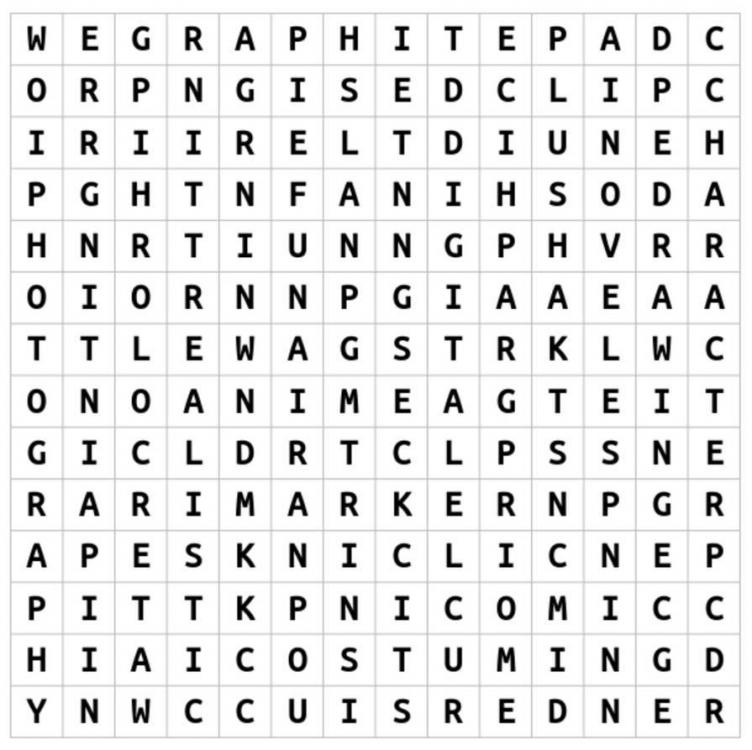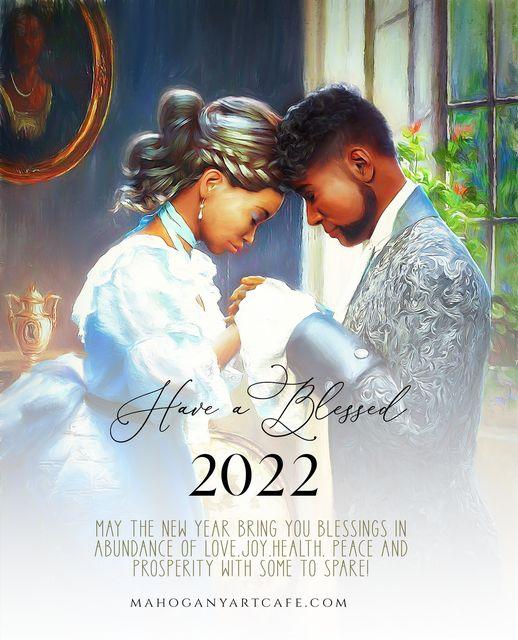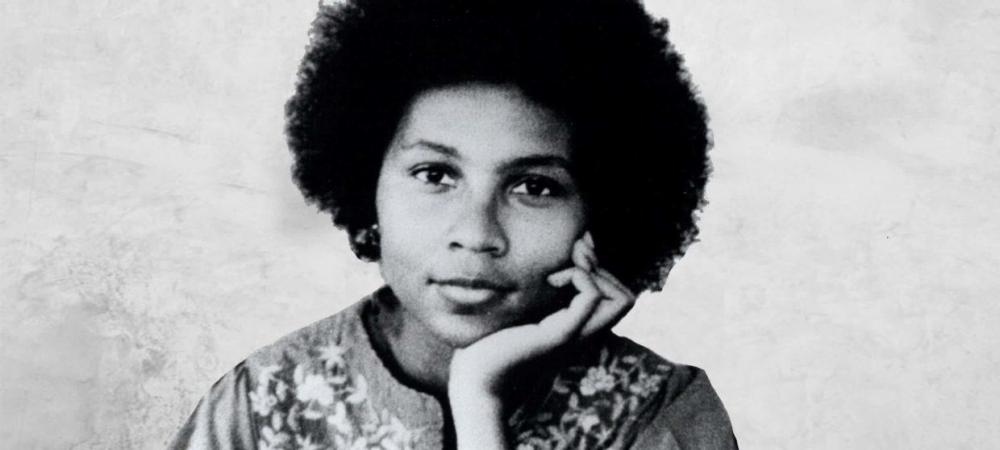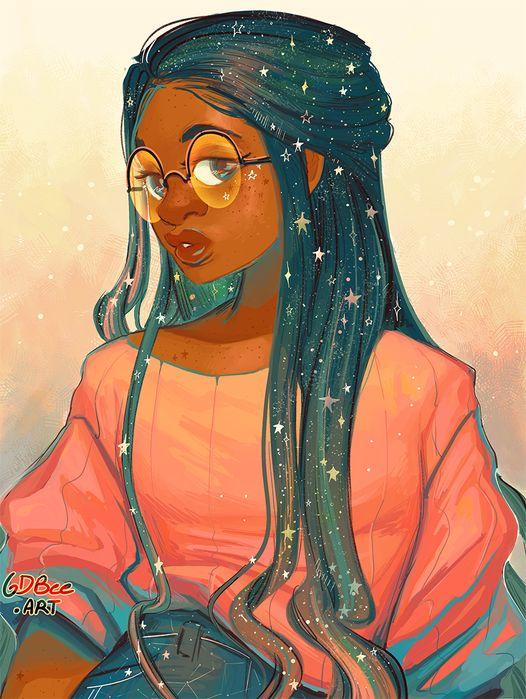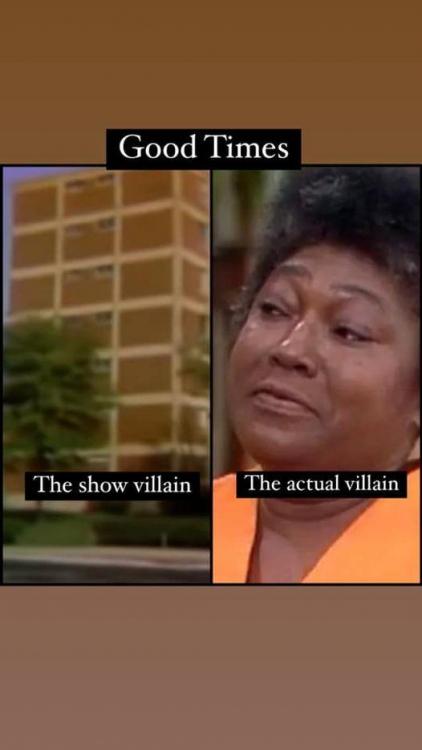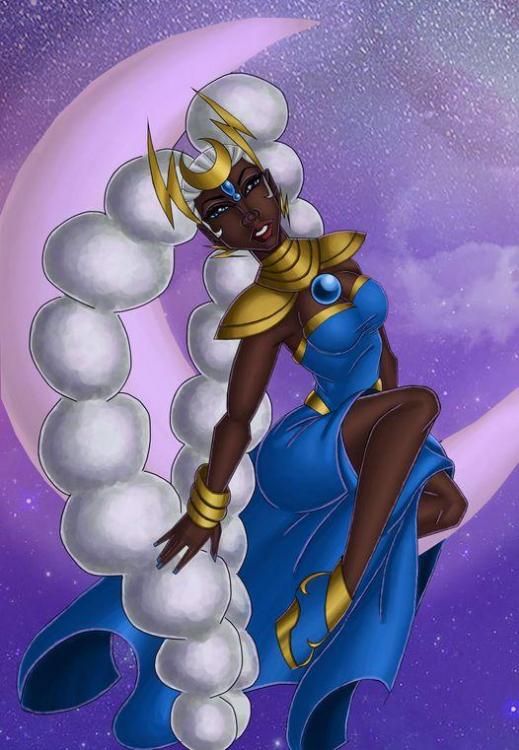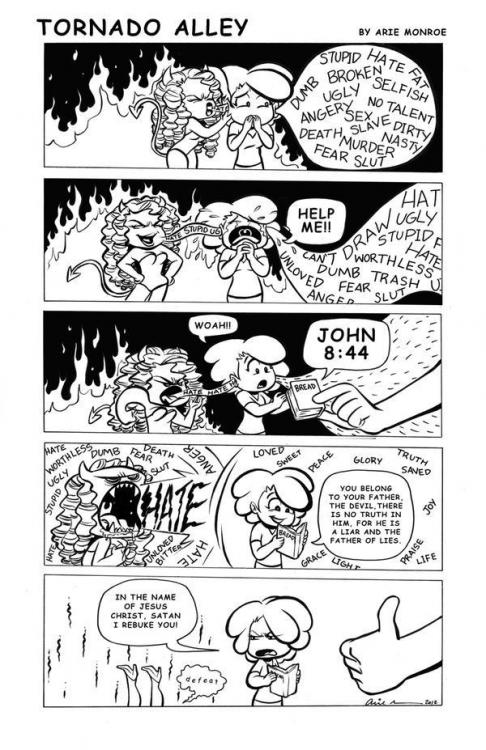-
Posts
2,425 -
Joined
-
Last visited
-
Days Won
91
Content Type
Profiles
Forums
Blogs
Events
Status Updates posted by richardmurray
-
Title: Art Divination
Artist: Deviantart Team
The first word you see is your art focus for 2022!
What did you find?
https://www.deviantart.com/team/art/Art-Divination-902706215
-
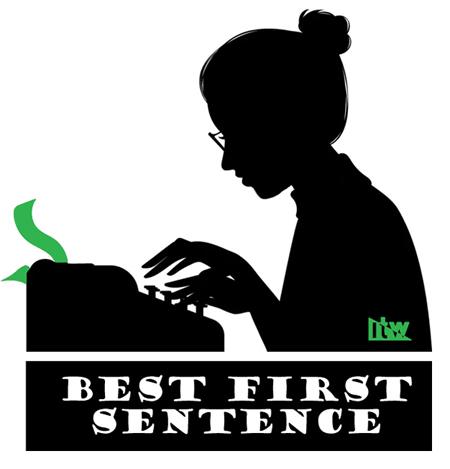
The ThrillerFest XVII - 2022 conference will be held at the
Sheraton New York Times Square Hotel
from May 31 - June 4, 2022.Enter our free and fun Best First Sentence Contest!
Each winner will receive a 10-page critique from one of the teachers of the Master Class. The deadline for entries is May 1, 2022.To enter the 2022 Best First sentence contest, please email your submissions to bestfirstsentence@gmail.com. You may only submit one entry. To qualify for entry you must be an ITW member or registered for ThrillerFest XVII (2022). Winners will be announced on Wednesday, June 1, 2022, at the CraftFest Luncheon and on social media. All winners will be notified shortly thereafter via email.
A few winning samples from the 2021 cohort:My mom told me I could do whatever I wanted for the whole summer I was fourteen, so I decided to find the Red Rock serial killer. – Melissa Yi
She sat on the rocking chair with the bloody knife in her lap and listened to the chorus of frogs while she waited. – Diane Bator
Beast was the name her mother gave her. – Matt Leyshon
-

MORE INFORMATION ON THRILLER FEST
ThrillerFest XVII | May 31 – June 4, 2022 — The Premier Conference for Thriller Enthusiasts
-
-

Title: To glam to give a damn
Artist: Deidre SMith Buck < https://www.deviantart.com/corpor8chic >
Her official site
http://mahoganyartcafe.com/ -
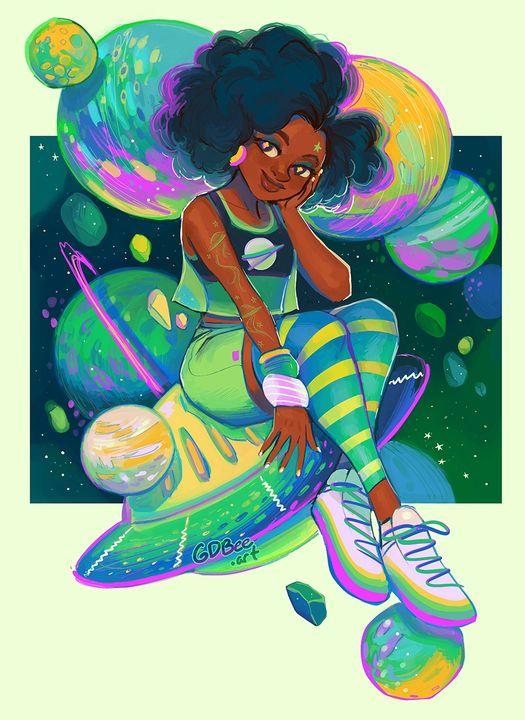
Title: First of the year
Artist: GDBee < http://www.genevab.com/>prior entry
Single Status Update from 12/28/2021 by richardmurray - AALBC.com’s Discussion Forums
-

Grants
INTRODUCTION
The FIYAH Literary Magazine Grant Series is intended to assist Black writers of speculative fiction in defraying costs associated with honing their craft.The series includes three $1,000 grants to be distributed annually based on a set of submission requirements. All grants with the exception of the Emergency Grant will be issued and awarded as part of Juneteenth every year. The emergency grant will be awarded twice a year in $500 amounts.
The grants are limited to prose only for now. If you are interested in sponsoring grants for poetry, editorial, or visual/graphic media, email team [at] fiyahlitmag.com.
AVAILABLE GRANTS
1: The Rest GrantThe FIYAH Rest Grant is for activists and organizers with a record of working on behalf of the SFF community, but who are in need of respite or time to recommit to their personal projects. Application materials include a 1-2 page personal statement on one’s history of work or ongoing projects on behalf of an inclusive SFF space.
2: Emergency Grant (2x $500)
This is a needs-based grant to assist Black SFF writers with emergency financial circumstances which may be interfering with their ability to write. Emergency circumstances may include but are not limited to threat of eviction, payment of school fees, compromised or destroyed equipment, injury, travel for family care-taking in a time of crisis, or disaster or medical related relief. The Emergency Grant is awarded biannually, once in March and once in October. Application requirements include a 1-page statement detailing the nature of the emergency need for funds and intent for its use.
3: Study Grant
This grant is to be used for defraying costs associated with attending workshops, retreats, or conducting research for a writing project. Application requirements include proof of acceptance to a workshop or retreat (where applicable), a 1-page description of the work requiring research, and a 3k-word writing sample.
4: Craft Grant
This grant is awarded based on a writer’s submitted WIP sample or project proposal, in the spirit of assisting with the project’s completion. Application requirements include a 5k-word writing sample, a 1-page proposal or synopsis of the project in question, and an introductory document detailing your goals for the project after completion.
ELIGIBILITY
Applicants for any FIYAH Grant must:Be 18 years of age by June 19th of the application year
Be a writer of speculative fiction. Speculative fiction is an umbrella term for fantasy, science-fiction, horror, magical realism, and their associated subgenres.
FIYAH Grants, like our other submissions, are open to Black people of the African Diaspora. This definition is globally inclusive (Black anywhere in the world) and also applies to mixed/biracial and Afro-appended people regardless of gender identity or orientation.Submissions for all grants begin January 2022. Return to this page at that time for access to the submission portal to send in your materials
https://www.fiyahlitmag.com/grants/
-

It’s not only elves that are busy making in December! Find projects, presents, and holiday props (call it decor if you must) all month long in our Maker Advent Invent Calendar. Check in each day for a new project to make, inspiration, and a whole lot of maker cheer. Show us what you make by tagging us on social and using #maketogether!
https://make.co/maker-invent-calendar/ -
-
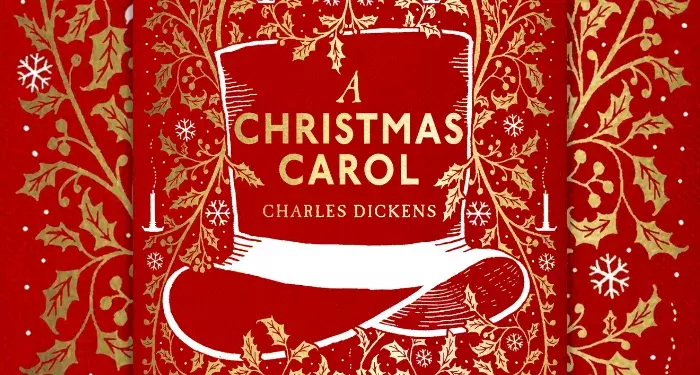
THE POLITICS OF A CHRISTMAS CAROL
By Walker Caplan
December 7, 2021, 11:18am
There is some debate over what, ultimately, the message is in A Christmas Carol by Charles Dickens. Is it pro-Christmas and Christianity? Anti-capitalism? Socialist? People have been arguing about the politics of A Christmas Carol since its publication in 1843, and will probably continue to do so for some time. Here’s what I’ve found — and please note that this will be a mix of facts and opinions. I’ll try to keep them straight.First, I started by actually reading this novel for the first time. I don’t know if anyone else has noticed this, but Charles Dickens was very good at writing! I must have highlighted a good 30% of the text (I read an ebook on my phone, but to be perfectly honest I highlight my paper books, too). Because I was already thinking about the politics (for lack of a better word) of the story, the moral if you will, I read it with an eye to authorial intent.
Now. I do not think that authorial intent is the be all, end all source of meaning in any piece of writing. What the reader takes from it is just as important! Sometimes more important! And of course, Dickens has been dead for some time and cannot exactly tell us what he meant to say by writing A Christmas Carol. Perhaps he merely wanted his penny a word*.
Dickens was not actually paid by the word, but by the installment of his serialized stories; it came out to about a farthing, or quarter of a (British) penny, per word. Adjusted for inflation, and assuming I have mathed correctly, an 1843 farthing is equivalent to something like £33 ($44 USD) today; I was paid 1¢ per word for my most recent story sale, 178 years later. Ebenezer Scrooge is implied to be the wealthiest man in his neighborhood; the wealthiest man in the world right now, Elon Musk, makes an estimated $16 million per hour. This is what we might call a wage gap.
Is it possible that A Christmas Carol is merely an ode to Dickens’s favorite holiday; that it is not intended as a morality story, but merely a moral one? I cannot say. I doubt it. But I believe he lays out at least part of his mission statement (via nephew Fred) early in the novel:
But I am sure I have always thought of Christmas time, when it has come round — apart from the veneration due to its sacred name and origin, if anything belonging to it can be apart from that — as a good time; a kind, forgiving, charitable, pleasant time; the only time I know of, in the long calendar of the year, when men and women seem by one consent to open their shut-up hearts freely, and to think of people below them as if they really were fellow-passengers to the grave, and not another race of creatures bound on other journeys.
Again at the end, when Scrooge wakes up and finds that he still has time to be the man he’s become on his journey, Dickens reminds us what story he is telling:
“I will live in the Past, the Present, and the Future!” Scrooge repeated, as he scrambled out of bed. “The Spirits of all Three shall strive within me. Oh Jacob Marley! Heaven, and the Christmas Time be praised for this! I say it on my knees, old Jacob; on my knees!”
He became as good a friend, as good a master, and as good a man, as the good old city knew, or any other good old city, town, or borough, in the good old world.
It seems to me that authorial intent is to show the folly of greed and selfishness by telling the story of a man remembering that he was once a person with feelings, seeing that his stifling of all such feeling in favor of greed has hurt the people around him, and wishing for more time with which to do good with what he has. Is this a Christian message? I suppose so, but not exclusively. Christmas (arguably the most Christian holiday, though I won’t argue with you over it) is the medium for the message, but it might just as well be something else.
Dickens certainly does not think the system — which boils down to capitalism, though it is different in several ways from modern capitalism — is a good one. He shows this especially blithely by having the Spirit of Christmas Present throw Scrooge’s own words in his face when he is concerned about the poor spirit children, Ignorance and Want, who cling to the Spirit:
“Have they no refuge or resource?” cried Scrooge. “Are there no prisons?” said the Spirit, turning on him for the last time with his own words. “Are there no workhouses?”
Having concluded that this was his intent as far as it was laid out in the text, I went looking for other opinions — perhaps even a few facts — and immediately found a Time article explaining that he had originally intended to write a pamphlet titled “An Appeal to the People of England on behalf of the Poor Man’s Child,” inspired by a report on child labor. Indeed, this report shows up in the text in the form of Bob Cratchit’s children Martha and Peter working to help support the family.
I also found an NPR piece calling A Christmas Carol unequivocally political. The author points out that in the same decade that he wrote A Christmas Carol, Dickens, living in the United States, was a vocal advocate for the abolition of slavery and for copyright laws. At a government level, what might the elimination of poverty — the real villain of A Christmas Carol — look like? Would it be charity, as represented by the prize turkey Scrooge sends to the Cratchits? Or would it be closing the wage gap, as represented by the raise he gives Bob the next morning?
Or is it simply a story about understanding one another’s humanity and showing friendship to each other?
ARTICLE
https://bookriot.com/the-politics-of-a-christmas-carol/
Enjoy, a white house carol
https://aalbc.com/tc/blogs/entry/133-a-white-house-carol/Sandra Newman is writing a feminist retelling of Nineteen Eighty-Four.
By Walker Caplan
December 7, 2021, 11:18am
As The Guardian reported this morning, George Orwell’s estate has approved Sandra Newman’s Julia, a retelling of Nineteen Eighty-Four from the perspective of Julia, the woman with whom Winston Smith has an illicit affair before they are captured and re-educated by their totalitarian government.According to The Guardian, Orwell’s estate said it had been “looking for some time” for an author to tell Julia’s story, and Newman “proved to be the perfect fit.” “Two of the unanswered questions in Orwell’s novel are what Julia sees in Winston, and how she has navigated her way through the party hierarchy,” said Bill Hamilton, the estate’s literary executor. “Sandra gets under the skin of Big Brother’s world in a completely convincing way which is both true to the original but also gives a dramatically different narrative to stand alongside the original.” According to Granta, Newman’s publisher, George Orwell’s son Richard Blair has also approved the project.
“It was the man from Records who began it, him all unknowing in his prim, grim way, his above-it-all oldthink way,” the novel opens. “He was the one Syme called ‘Old Misery.’ Comrade Smith was his right name, though ‘Comrade’ never suited him somehow. Of course, if you felt foolish calling someone ‘Comrade,’ far better not to speak to them at all.”
This project follows Newman’s upcoming novel The Men, which chronicles the events following the disappearance of every person on earth with a Y chromosome.
Article
https://lithub.com/sandra-newman-is-writing-a-feminist-retelling-of-nineteen-eighty-four/
What I like is the title of the article is false, this is not a retelling of nineteen eighty four, it is an addition to the telling, taking a character whose story is not fleshed out and fleshing it out
Cheugy, omicron and dogecoin among this year's most mispronounced words
William J. Kole · The Associated Press · Posted: Dec 07, 2021 12:14 PM ET | Last Updated: December 7, 2021
ARTICLE
https://www.cbc.ca/news/entertainment/2021-most-mispronounced-words-1.6276260
Glasgow (GLAHZ-go) ahhh for decades I didn't realize this:)REFERRING ARTICLE
https://kobowritinglife.com/2021/12/10/feminist-1984-a-nobel-winning-speech-and-cookbook-copyright-this-week-in-book-news/
-
May your spirit fly high Bell Hooks
hooks’s family said contributions and memorials can be made to the Christian County Literacy Council < https://www.paypal.com/donate/?hosted_button_id=CGQPNACBYNRZA > , which promotes reading for children, or the Museums of Historic Hopkinsville Christian County < https://www.paypal.com/donate/?hosted_button_id=CGQPNACBYNRZA> , where a biographical exhibit is on display.
ARTICLE
https://lithub.com/bell-hooks-generous-feminist-thinker-has-died-at-69/
What It’s Like to Have Your Book Banned by the School Board
BY MARY HARRIS
DEC 13, 20213:06 PM
Ashley Pérez used to teach English, down in Texas. Back in the early 2000s, that meant assigning the so-called classics—To Kill a Mockingbird, Of Mice and Men, Shakespeare. I asked her whether there were any books she wouldn’t teach. “I didn’t teach from my district literature textbook at all. Actually, we used them as doorstops,” she said. “I think that when literature is put in a textbook, it stops seeming alive.”Pérez writes young adult books now, but the way she said that last bit—the way she talks about literature being “alive”—I felt like I was back in the classroom with her, feeling the muted thrill of AP English. Because Pérez taught mostly Black and Latino kids, she thinks a lot about how to make books like hers welcoming for all kinds of readers. That means thinking about the hidden messages her stories can send.
But finding Pérez’s book in a school library has gotten a lot harder over the past year. That’s because, as careful as she is about being inclusive when she writes, some people say they feel left out of the narrative. And those people are showing up at school board meetings, demanding books like hers get pulled off the shelves. The American Library Association has called this year’s spike in book banning a “moral panic.” On Monday’s episode of What Next, I spoke with Pérez about what it’s like when your book is the one getting yanked out of libraries. Our conversation had been edited and condensed for clarity.
Mary Harris: Before we get to the backlash over your book, Out of Darkness, can you describe the work, in your own words?
Ashley Pérez: Out of Darkness is a love story. It’s an interracial romance between a Mexican American girl named Naomi, who comes to East Texas from San Antonio, and an African American boy named Washington—Wash is what he goes by. And it’s set against the backdrop of a historical event that occurred about 20 minutes from where I grew up, which is the New London School explosion. A lot of people have never even heard of this event, but in March of 1937, there was a natural gas leak in the school that, when it ignited, caused a huge explosion and the estimate of deaths is close to 300. They never knew for sure because all the school records were destroyed in the explosion.
Something else I noticed when I was reading about Out of Darkness is that I don’t think it’s an easy read. The New York Times review is written by a pretty grizzled reporter, and he wrote, “I actually had to close the book at one point to seek respite with Facebook. And puppies.”
Yeah, I remember that. I agree completely. And often when I hear from folks about the challenges of reading it, I can only respond with understanding, because I lived inside that story world. My heart is still buried in that book. But it is a challenging narrative. It’s a book for a student who is willing, wishing to engage with some very difficult histories. They’re histories of racial violence, histories of sexual abuse, histories of misogyny—those things are all there in the book. There is also a lot of love and family and playfulness and joy that’s happening in spite of those ever-intensifying pressures and constraints.
Pérez says when Out of Darkness was released back in 2015, she braced herself for some kind of pushback. But in the six years the book had been out, she never really got any. That is until she got word back in the spring that it had been put on a “pause” in a Central Texas school district. Then, over the summer, a video emerged. It shows a parent, Kara Belle, objecting to a passage in Pérez’s book. She’s speaking at a school board meeting just outside of Austin.
The words Belle’s quoting in the video do appear in Out of Darkness, but she is compressing an entire scene into a string of buzzwords. In this scene, Naomi, the main character, has walked into a new school. Her classmates recognize she’s the prettiest girl there. But they dismiss her because of her race. “A Mexican is a Mexican is a Mexican,” one girl says. And the boys? They daydream about sexually assaulting Naomi.
In September, I had the pleasure of seeing Kara Belle do a dramatic reading of a series of snippets from a chapter of Out of Darkness in a school board meeting in a video that went viral. It circulated with headlines like, “Texas Mom Loses It Over Anal Sex.” She was reacting to the inclusion of the word cornhole in a passage that was from the perspective of white high school students in this 1930s Texas school who were objecting to the arrival of a Mexican American student in their class and we were seeing how the young men in the class were viewing her as a sexual object, etc.
And we should contextualize the video. This mother goes to a school board meeting. She’s just yelling words at you, and you don’t really know what she’s talking about
Nor does she know what she’s talking about, right? Because she definitely hasn’t read the book.
When I reacted to this, my brain was just kind of scrambled because I was like, “What is going on here?” But those are your words. How did you react?
It’s so painful to hear something that you’ve worked incredibly hard to shape and to present in a way that is part of a literary whole—to see someone just yank those phrases as if any of the phrases that she’s using are things that I endorse. Several of the things are dialog, and the whole point of the passage is to show readers what the main character has to endure, what she has to navigate, the ideas and perspectives and limiting beliefs that are circulating in the school space where she has to spend eight hours of her day.
But this parent is not interested in the function of that passage in the work as a whole, nor is she interested in the work as a whole. There’s a reason she’s reading from something in the first 30 pages. These parents have been steered toward particular books by websites like No Left Turn or Moms for Liberty, so they’ve already decided that this book needs to go, and they’re just looking for what will be the most attention-grabbing. Particularly this individual knew, I think, that her presentation of the topic was going to grab attention. And that was the goal.
You pointed out too that what the district did here—because this woman did win, and the book got taken off the shelves—violated their own policy. Their policy was that they might review a book, but during that time, the book would remain on the shelves. That’s not what happened here.
No. And unfortunately, in these challenges that are happening all over the country, we’re seeing that over and over. Districts have these policies for a reason. If I, as an English teacher, was afraid that one parent complaining would mean that all the books I was teaching were going to be removed, then what am I going to teach? I’m not going to teach the thing that’s challenging and controversial in some way. I’m going to teach the most unobjectionable thing. And that’s kind of the goal here is to chill discourse and intimidate teachers and librarians. So it’s not even just about removing Out of Darkness from the library. It’s about creating an environment in which the librarian, the next time they order books, is going to think twice before choosing a book that engages with difficult histories in our nation or that engages with LGBTQ identities or that engages with teen sexuality in some way, even if that book is highly recommended in professional journals for school libraries.
Another thing that bothers Pérez is that while parents are often complaining to their schools about the sexual content of books like hers, that doesn’t seem to be their true objection to what she’s written. And she feels like that because she sees the books that aren’t getting banned.
I portray these events to challenge them, not to endorse them. Now, I often bring up the Bible because I grew up in a Bible church and I know that book really well, and I ask, “Do you think that the Bible is grooming young people to be sexually abused or gang raped or to engage in incest, because all of those situations occur in that text?” There’s just no denying the pattern of which books are being targeted. Even though the most common reason given is sexual content, it is not the sexual content that these books have in common. These books have in common centering characters or experiences from nonwhite, nondominant communities. If I could make a stack of all of the books in the high school library with sexual content and make a stack of those that feature straight white middle class characters, that’s going to be the highest stack. But those are not the books that are being challenged. And every middle school and high school in Texas, I’m willing to venture, has copies of the Bible. So this idea that this content is unacceptable in some books but fine in others is where I feel the actual intentions, and what kind of message is really being sent becomes clearer.
Part of the reason I wanted to talk to you was this statistic from the American Library Association, which found that these conversations about banning books in schools, they’re happening more often this year than last year. And it seems like a major spike. Given that statistic, I had this question for you: Do you think there are any books that should be banned from schools?
No, I think once a book is included in a school library, I trust the librarian’s judgment. Although there’s no comparison in terms of volume of challenges coming from folks who identify as conservative versus folks who identify as liberal, there have been a handful of cases where there was a call for the removal of To Kill a Mockingbird or Of Mice and Men. And I firmly believe that those books do belong in school libraries.
We should be clear that the reason why I think many educators have become uncomfortable with To Kill a Mockingbird is that it puts forward a white savior narrative.
Yeah, but discomfort is not danger. Teaching To Kill a Mockingbird in an unqualified way, without contextualizing those issues, is at this point irresponsible. But to teach it in ways that highlight and address those problems can be very powerful. And frankly, our literature is full of narratives that are problematic in many of these ways, and we don’t have to teach every one of those problematic narratives. But to find opportunities—even if it’s saying, OK, I’m teaching this other novel, but I’m going to step to the side and have my students read a chapter or two from To Kill a Mockingbird so we can talk about the difference. What’s different when African American characters are portrayed as having agency in their own lives versus when they are portrayed as secondary to the actions of a white character?
One parent in Houston who successfully petitioned her school into getting rid of a couple of books, not your book, explained herself by saying that she’s not into censoring. That’s not what this is about for her. She sees this more as we filter students internet access. We have keywords and trigger words. We know people shouldn’t have access to certain things as a minor. Why isn’t this the same process in school libraries? And I wonder what you’d say to that.
Well, what’s missing from that is attention to what is the material. It’s not a website, it’s a work of literature.
What’s the difference?
Whenever folks are talking about, “We have filters for these other things,” I want to say libraries have those filters, too. They come in the form of professional reviews, librarians referring to the recommendations of professional journals. They can’t read every book. That’s true. But there are resources that guide their selection. So there’s already been filtering. And in the case that they include something that has sexual content, like Out of Darkness, there is a track record of professional, trustworthy organizations evaluating that content and saying, “Yes, this is functioning as part of a literary whole.” It’s not there to glorify the situation. It is part of a story that complicates and challenges that.
It’s not the same as accidentally clicking on pornography.
Exactly, and to imply that it’s the same just reveals a lack of understanding about what it is to engage with literature.
The increasingly heated rhetoric I’m hearing right now when it comes to what kids can and can’t read, the entry point for a lot of parents—what seems to get them so upset—is sex. I wonder a little bit what you make of this sexual panic that is focused on books that deal with race. If you look at the Virginia governor’s race, there was a lot of talk about the book Beloved. Another book that has gotten a lot of attention in the past year was this book Lawn Boy. There’s a very similar school board meeting to the one that happened for your book, where a woman gets up and reads passages where it’s really frank conversations about gay sex, being a queer kid, being a fourth grader having sexual thoughts—stuff that’s tough and stuff that’s challenging.
It’s stuff that’s tough. It’s stuff that’s challenging. But it’s also real. And again, that’s where I come back to: Who am I serving? And I certainly care about parents and their perspective, but I am not writing to please parents. And also, you can’t create literature if you are trying not to offend people. Literature has always taken me to the far, far edge of what I can bear. I’m never comfortable when I’m writing because the things that are worth writing about challenge us.
Can you tell me how your life changed after this video went viral of a woman just dragging your work?
Yeah, my editor called it vandalism, and I appreciate that. The most significant effect has been that because this was so high-profile, my book, which is perhaps more widely read in Texas, since it’s set in Texas, all of a sudden is on the radar of basically every parent participating in this kind of orchestrated challenge. I have been sent lots of materials from private Facebook groups in these communities where my book’s been challenged, removed, or banned. And this is going to sound cynical, but the reason so much of this focus is on sexual content is because folks know they can’t challenge something with a focus on the race of characters or the sexual orientation of characters.
What do they say in the Facebook groups that makes you think that?
I’m going to paraphrase this, but basically, “When you challenge these books, focus on the sexual content, do not use the words gay sex, do not use LGBTQ, do not talk about race. Books can’t be removed for those reasons.” It’s that clear. So while some parents may be there objecting because of the sexual content, there’s clearly an agenda that’s about other issues. It’s about reclaiming this idea that somehow education has been taken away from conservative communities, or that their stories are no longer central. It is really that explicit.
I’ve heard from many school leaders that they’re overwhelmed and exhausted with public information requests. Parents are showing up, even though they’ve passed the number of requests you can make for free, who have no issue running up bills of $500, $600 because they have funding.
And they were requesting like emails or communications?
Purchase orders from the library, beginning of year surveys to check if teachers ask students for preferred pronouns, things like that. They are basically looking for signs that the way things are being conducted in the school somehow violates the principles that they think should govern education.One thing I always want to say really clearly and strongly, especially when being asked about my experiences with this situation, is that what we as authors are going through when these books are removed is a fraction of the struggle and suffering that is occurring for the librarians and the teachers and, above all, the students in these communities. Because trying to learn, trying to teach in an environment of such hostility and opposition is unfathomably difficult. And I hear from teachers and librarians all the time who are at their limit.
The thing I wish I could say to middle-of-the-road parents—parents who might hear a video like that and think, Oh, I don’t think anal sex is the best thing for middle school. Maybe that parent has a point. I would want them to understand that what is happening is that teachers’ and librarians’ and schools’ resources are being pulled away from teaching students and being sucked into these manufactured controversies.
ARTICLE
https://slate.com/news-and-politics/2021/12/texas-school-board-banned-books-ashley-perez-out-of-darkness.html?utm_source=Sailthru&utm_medium=email&utm_campaign=Lit Hub Daily: December 15%2C 2021&utm_term=lithub_master_listPRH and S&S call the lawsuit against them “legally, factually, and economically wrong.”
By Walker Caplan
...
Besides wanting the merger to happen, Penguin Random House has another incentive to fight the DOJ’s lawsuit: according to the New York Times, if the merger doesn’t go through, Penguin Random House will have to pay ViacomCBS, Simon & Schuster’s seller, a termination fee of about $200 million.
...
ARTICLE
https://lithub.com/prh-and-ss-call-the-lawsuit-against-them-legally-factually-and-economically-wrong/REFERRAL ARTICLE
https://kobowritinglife.com/2021/12/17/a-misguided-lawsuit-barack-obamas-faves-and-the-loss-of-two-literary-giants-this-week-in-book-news/
-
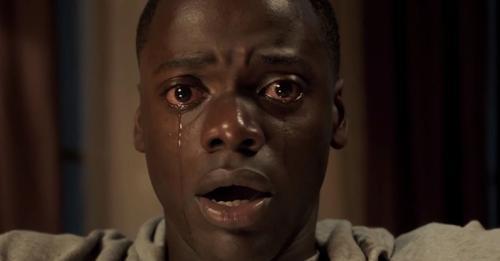
ARTICLE
Daniel Kaluuya:“I ask the script, ‘What do you want me to do?’”
(arranged by Carmichael Phillips)
If you’ve ever seen the Jordan Peele cult classic horror film, Get Out, then you already know that Daniel Kaluuya is an incredibly gifted and natural actor, with the ability to make you forget you’re watching an acting performance. He never pushes or forces his performance. It just seeps out as smoothly as sweet honey.
If his performance in Get Out is any indication, Kaluuya has a wonderful acting career ahead of him. Indeed, he earned an Academy Award nomination for Get Out, even though it was his first real breakout role. And at the 2021 Oscars, he received an Academy Award for Best Supporting Actor for his role in Judas and the Black Messiah.
With an already impressive, if developing career, one might question, “How does he do it? What’s his secret?”
In a recent interview with Backstage, Kaluuya briefly described his process to character development.
“I ask the script, ‘What do you want me to do?’” Kaluuya explains.
“Especially if I love a script…I let it tell me what it is. That’s how you can always be OK in this acting thing.”
Kaluuya went further, to add a little more detail:
“I’ll just read a script every day, set it aside, read the script, set it aside, every day.”
“And then I would do this exercise where I write everything someone says about you, write everything you say about yourself, write everything you say about someone else, and write the facts.”
“Like the facts are if a character has a brother, he has a grandma, any facts that are in the script, write those down. Your character lives in what you say about yourself or what someone says about you.”
Kaluuya used this approach for his latest role. In Judas and the Black Messiah (2021), he portrayed Fred Hampton, a charismatic leader in the Black Panthers’ Illinois Chapter in the 1960’s, who was gunned down by police.
Once again, his approach proved its value. In addition to winning an Academy Award for Judas and the Black Messiah, Kaluuya also won both a Golden Globe Award and a British Film Academy Award.
MY THOUGHTS
Kaluuya is correct, in screenplays all to often, details of a character exist that actors when they portray the character don't seem to cognize. In get out you comprehend his friendship with his friend who works for the airports. you cognize he is aware of the world outside his relationship with his white girlfriend , you sense his ignorance to her or her family and you watch that ignorance slowly ebb away , till he has his former girlfriend strangled as she is bleeding to death. Where she reveals her obsession/her fantacism while he reveals he is still himselfARTICLE LINK
https://actingmagazine.com/2021/05/daniel-kaluuya-i-ask-the-script-what-do-you-want-me-to-do/
-
FROM : MAd SKillz < skillzva on facebook>
I may get crucified for this but its how I feel.(just jokes)
 I grew up in a similar situation...no father tho. And I NEVER IN MY LIFE seen a woman with this many morals. EVERRR BRUH. Being that poor and having those kind of morals never made sense to me. Black Jesus brought yall good luck? You made James take him down. James finds 5k? You make him give it back. They wanted yo ass to star in a PAID Vita Brite commercial? You didnt do it cuz it had alcohol in it. James going to the pool hall cuz yall bout to get evicted? You made him put the pool stick back. They pass JJ up to the 12th grade? You made him go back to the 11th. Preacher wanted to take James on the road to do the "Im healed" scam? You made him stay home. The projects were not the villain of this show. FLORIDA WAS. YOU WERE THE BIGGEST HATER ON TELEVISION.
I grew up in a similar situation...no father tho. And I NEVER IN MY LIFE seen a woman with this many morals. EVERRR BRUH. Being that poor and having those kind of morals never made sense to me. Black Jesus brought yall good luck? You made James take him down. James finds 5k? You make him give it back. They wanted yo ass to star in a PAID Vita Brite commercial? You didnt do it cuz it had alcohol in it. James going to the pool hall cuz yall bout to get evicted? You made him put the pool stick back. They pass JJ up to the 12th grade? You made him go back to the 11th. Preacher wanted to take James on the road to do the "Im healed" scam? You made him stay home. The projects were not the villain of this show. FLORIDA WAS. YOU WERE THE BIGGEST HATER ON TELEVISION. 

 check my story for the proof.
check my story for the proof.
MY REPLY
Where do I begin?
Lets start with his points and he made many.
I will iterate the points
POINTS
1) he grew up similar to the scenario in good times, and he mentioned no father specificially.
2) he never knew a woman with this many morals
3) being fiscal bottom and having high morals never made sense.
4) the projects, the white system, wasn't the criminal, Florida, the specific moralled black matriarch wasMY THOUGHTS TO EAH POINT
1)If I ask the average person in the usa today, who are the richest people in the usa as a group, what is their phenotype. They will say, most fiscally rich people are white, a label referring to their average skin tone , which does merge into the mulatto range, ala passing. The next question is, how do they get their money? Most will say the truth, inheritance, their forebears had money and gave it to them.
Now, if I ask most people, why are black people poor? Most will say, Black people don't know how to play the game. Black people are lazy. Black people need to improve themselves, learn to strive more. Few will say the simple truth, Black people have no one to inherit money from. The next question is why? And this goes to history.
One of the problems with the black community in media, is that our poverty is rarely comprehended as simple as it needs to be. Two cultural institutions in the usa didn't allow for black inheritance. First was slavery, second was jim crow. Slavery predates the usa, which is another truth I find most in the usa don't seem to comprehend. Slavery is from the european colonial era but it survived in tact , unblemished, after the creation of the articles of confederation or the constitution, thus why most free blacks fought against the usa in its earliest wars. Slavery ended with the thirteeth amendments and the destruction of the southern states, and the desire of the northern states to eliminate the financial competition with a slave based society utilizing industrial tools. But after a very short respite <solid seven years > called reconstruction commonly, Jim Crow was born from the dead carcass of slavery and continued the goal of denying inheritance to black people.
That is why the black community in the usa is fiscally poor. Jim crow ended , in my assessment, in the 1980s. So from before the usa was founded till the 1980s, Black people were in majority <yes, exceptions always exist in life but they are not stnadards or pathways or rules> denied inheritance. The projects themselves were never meant for black people. If you know the history of the projects, they were meant for poor working whites to have a place in an urban setting to refind their fiscal bearings, starting in the 1950s. White flight from big cities and continual movement to big cities by non whites made the white city governments change course and offer projects as dens for people not white mostly to congregate in the city. A eternal source of cheap labor and fiscally poor people. Whereas projects in the 1950s had storefronts, the latter ones did away with that and just became housing.
Did you know that when the vietnam war ended, vietnam had hundreds of thousands of orphans from usa soldiers and vietnamese women living in orphanges? now, why does this matter?
It connects to slavery/jim crow, and relationships between child bearers. Slavery plus Jim crow denied inheritance for black people. The primary tool was violence. but a secondary tool was separation. To be blunt, during slavery black people were not married in majority. Black women were property of the master. the master, to use crude language, tapped that ass , more than the property of the white man she called her black husband. So since the community of the usa is from the european imperial era, for most of the history of the usa or what preceded it , black children have not had either parent. I am not saying that to reject anyone's emotions, but to bring a historical reality to black people's narrative around child raising which rarely admits reality about our community in the usa. Jim crow is what rebuilt the south and spurred the usa industrial machine. That is another historical fact that goes absent. Jim crow was powered by black men in prison on false charges. These men were given sentences meant to be for life, for the purpose of rebuilding the usa. The 13th amendment says slavery can still exist in prisons so white people in power ushered black people, specifically black men, into prisons.
I was raised by both my parents who are still together and loving, through many challenges. And my family is upper poor, not the fiscal bottom.
But, white or black filmmakers push two narratives, for different reasons that are lies. The narratives are: black people's poverty is a modern thing not from a lack of inheritance over centuries, the black family unit has its members to blame for its history of fissure.
Good times, written by whites, uniquely has a loving black father, who died because of Amos disagreement with the studios. But his death fits the truth, the environment for the black community which has been engineered by whites over centuries has successfully hindered black people, is not meant to, has hindered. And, the black people who traveled to the north to escape being burned alive and possibly find work, found fewer fires up north but less fiscal potential. But whether in the south or north the reason is a lack of inheritance, not lazyness or anything else.2)+3) I must combine. His comments prove how many black people either do not know the history of black people in the usa or have a false interpretation of it.
The Club Women was a group of black christian women who believed that if black people educated themselves and showed utmost manner that will overcome white violence. The sit-ins was based on a similar principle. This was black people saying I will go into a story where a sign outside says for people like me to NOT ENTER. The result is obvious, you enter a place where you are told by its owners for you not to come, you get your ass beat. Hell, most people know about romeo or juliet but what do you think the capulets and the mantagues were like? What is funny about the usa and the sit-ins and the club women is how , in human history it is so common for groups of people to ban others. In northern ireland they have many places where catholics can't go and protestants can't go.
So, When he says he didn't know any woman with this many morals, I will not deny his statement. But it proves he didn't know enough older black people who could tell him of many who did such things. Remember, non violence isn't merely about the white man not being violent to blacks but it is about blacks not being violent ourselves even when faced with reason to be.
Most black leaders, including MLK jr, never prescribed to such extreme views of non violence personally. but, the black community in the usa from the time of reconstruction has a long history of it.
Now is, Florida a caricature? of course she is. BUT, she reflects the truth of the black community from the end of the war between the states to the 1970s. I know that some black people who were land owners told relatives to not fight whites and sent them away. I do not concur to the idea of fighting wars with morals, but that was and is a residual from slavery and jim crow.
And that comes to his dysfunctional allusion. Black people were not merely poor during slavery or jim crow, we were impotent. Fiscal poverty is one thing, but when one is fiscally poor PLUS under constant assault. It changes ow you view things. Again, I can tell you I know of black people off line who were alive in decades past and admitted that every black women in their town was raped by whites. every black woman.
When your community is under assault , and under watch for any action that is deemed illegal /criminal/amoral, it can teach you to desire morality not for god but for self. if you can't stop your wife from being raped, your child from being spat at, yourself, from being put in prison, and you don't have arms, you don't have resources, you don't have a community enabled, then following a higher moral code can be deciphered as your only defense.
Again, Florida is a caricature, but what she represents is truth. Any one's Esther Rolle's character's age knew that the system will destroy any black person it finds doing a simple crime. My great proof of that is the rockefeller laws, initiated in the 1970s. In NYC, white men could sell cocaine in mountainfulls and get lesser to no sentence that black men selling a bag of marijuana. That is why Florida feared crime, feared illegality. IT wasn't cause she feared or opposed money. But what if? What if the white man knew? what if the white man discovered? Just remember, the chicago police department went into fred hamptons house and murdered him, absent any crime. In that kind of environment, you are so keen to risk?
Some, yes, but Florida is not that big a caricature. She is, but not that big a caricature based on the black community in the usa.
The problem with black or white filmmakers is black goodness is touted as religious, spiritual, never historical, never based on life.
The goodness isn't about christianity , it is about a fear of the system treating you unfairly, which it will, which it proved over centuries it will do and is still doing. Movies from all sort of directorso or writers make is religious, and that is the flaw. Florida is scared. She has been scared her entire life and will die scared.
In the great Daughters of the Dust, the gullah live in those spare island lands, surrounded by bayou and absent any infrastructure, but will rather that than live exposed to whites. That is fear. The people of Tracadie in nova scotia, survived cause they lived so far away , in a wilderness, they were free from assault, whether they committed an illegality or not, and that is why Florida feared in her urban project surrounded by whites, in the heart of the white kingdom.
His point is to invalidate her fears by suggesting her morality is based on morals, but her morals are based on fear.4)LAstly, his final thought. The criminal wasn't the white system , it is the black moralled matriarch.
Of course he is wrong, he admitted he is joking. But, I will defend his hypothesis with a little fortune telling. Slavery plus Jim crow denied black inheritance. But, after jim crow, I will call it the rainbow era, Black people in the usa have acquired and started to inherit fiscal wealth. Florida's fears was suitable in the days where black people were denied by white people the ability to inherit fiscal wealth. But, when one is wealthy, one must take risks, and though most risks fail in fiscal capitalism , some will succeed.
The black community isn't potent. My proof is simple. Name me one city with a financial growth in the usa, where over half the cities fiscal quality/industry is owned by blacks? I will help you, you can't find one. So, Black people are not in some place of suitability yet. But, it will happen eventually. That is why whites blockaded black inheritance. when one inherits, money is different.
Back to movies, hollywood hasn't found a way to approvingly display multiracial wealth. We all know in modernity, black millionaires or billionaires exists in the usa. But, hollywood usually places fiscally wealthy black characters in fiscally white characters roles. The problem storytelling wise is simple. Being rich is being rich but in different communities, the collective path to being rich matters. The black fiscal elite, live as gluttonous as the white, but they have subtle variances and hollywood or independent film, has not found a set of films to visualize that difference. In the show atlanta, the black rich are ugly, but mirrors of white rich and that is not exactly true. As F Scott fitzgerald said, the wicked rich, I concur to that, but they have variances. My proof is fiscally rich white jews in film. in films, fiscally rich white jews are as corrupt as other fiscally rich white people but their is anuance to their design which shows, the other.
Films have yet , black or white made, to solidify the other aspect to the black fiscal rich which is clear to see, but not such a great selling pointIN CONCLUSION, history is important, but also challenging. The challenge in history is when it forces you to look at scenarios you can't control or undo that are not merely negative, but have a lasting communal impact. The nonviolent community , based in the black church, near 170 years ago, rejected violence, rejected a mass movement away, rejected a foscused movement in the usa. The nonviolent movement had three main strategies. No violence against whites, a focus on individual liberty to black people wherever we live, a responsibility on black individuals or the black community to maintain the nonviolent stance while moving ever upward in the fiscal or governmental halls in the usa.
Today is the result of that plan in the usa. it didn't fit all black people, it wans't meant to. It had casualty, though all black paths were and will have casualties. But, in the same way, Florida is chided while Mrs. Huxtable is beloved, the modern reality has meant a cultural precipice has been reached that isn't defined by either woman or their larger media spaces. Neither is an enemy, but neither reflect a black community that can finally , in peace, inherit.-

Was Florida Evans the criminal? is the question.
Lets take a look at her crimes. All her crimes he listed involve her hesitation at opportunities from luck,system, illegality.
Luck is black jesus/finding 5,000/Vita brite commercial
System is JJ passed up a grade
James Pool stick/Preacher scamFrom Slavery which predates the founding of the usa and was unchanged through the founding, thus why most free blacks fought against the usa, to the end of Jim crow, which in my view ended in the 1980s as a holistic system, but started immediately after slavery ended, Black people were denied the ability to inherit/have stable homes. Remember, the murdering and imprisonment of blacks, who mostly lived in southern states, started while the war between the states was finalizing. And before said war was slavery, where most black people were property not free. The black woman who calls that property her husband is in error. That black man who calls that property his wife is in error. The child in her belly is not their's. Their child is property of the person who owns them.
Now you can say, Rich, you just said Jim crow ended in the 1980s. Goodtimes is 1970s, can't Florida Evans let all the past go. Florida evans is a caricature, any extremity in any human character is a caricature, but her problem isn't morality or living in the past, her problem exists in most black people. Said problem is fear.
Florida is afraid. Black people today, who live better than black people ever before, as a community, in the usa, don't seem to realize, most black people in the usa or the european colonies that preceded it were terrorized. Slavery or Jim crow are mostly remembered as fiscal scenarios. One is absent money, but these scenarios also came with an equal share of terror. You cut the foot off a slave to terrorize, you whip a female slaves skin off to terrorize, you burn black towns or communities down to the ground to terrorize. You place false and exorbitant charges on a suspect to terrorize. The goal is to make the person you are terrorizing fear everything.
This is what the poster miss about Florida Evans. Just remember, Fred Hampton was murdered in his home no different than medgar evers was murdered outside his.
The christian god gives you luck, but what about the devil. You find 5,000 but what happens if someone comes to claim it. You are in a commercial but what if your hungry neighbors find out or your fellow church members see you in an alcoholic commercial. JJ is passed up a grade, but what has he truly merited. James is gambling but what happens if he wins and someone kills him for it.
Fear. And Black fear in the usa is well founded. Yes, Florida is a caricature. But, the history of the black community in the usa is full of reasons to fear, especially to those of her age.
Sequentially, why Mrs. Huxtable is beloved far more than Florida Evans. MRS Huxtable is afraid to. Why do you think she acts like the governess to everybody? She is no different than Florida in fears or matriarchal tactics. The difference is her husband was fortunate/lucky to become a doctor at a time when whites were willing to pay black doctors. Remember, black doctors have been in the usa since the 1800s, but getting paid fairly, fairly, was a modern inviention circa the 1980s.
Florida is a woman of her times, reflecting, even as a caricature, the warranted fears of a nonviolent community in majority denied: income/inheritance.
Black people for the first multiple of decades in the history of the usa or the european colonies that preceded it can now inherit. With that inheritance and all that it implies comes a lofty perch that it is easy to look down on those far less fortunate. Even if you are merely joking.
-
-
Happy Holidays!
Poetry Title: Twas the Night before Christmas
Author: TheLaurenVerse'Twas the night before Christmas,
When all through the house,
Not a creature was stirring
Except for one mouse.Mousey's cheese plate was out
With care by the computer-y,
In hopes that old Santy Claus
Liked charcuterie.But Mousey was awake
Scrolling through odds and ends.
They'd forgotten about gifts
For some of their friends!... Read the complete poem at the article link

Image Title: Holly Jolly Arty Party Semana 3
Artist: Erikaibaceta
Citation: In the article linked belowArticle- for more poems and art
https://www.deviantart.com/team/journal/Happy-Holidays-from-DeviantArt-901423183 -
Inheritance Trilogy Readalong Announcement [CC]
Thistle & Verse
https://www.youtube.com/watch?v=dCn9MFZ1h1o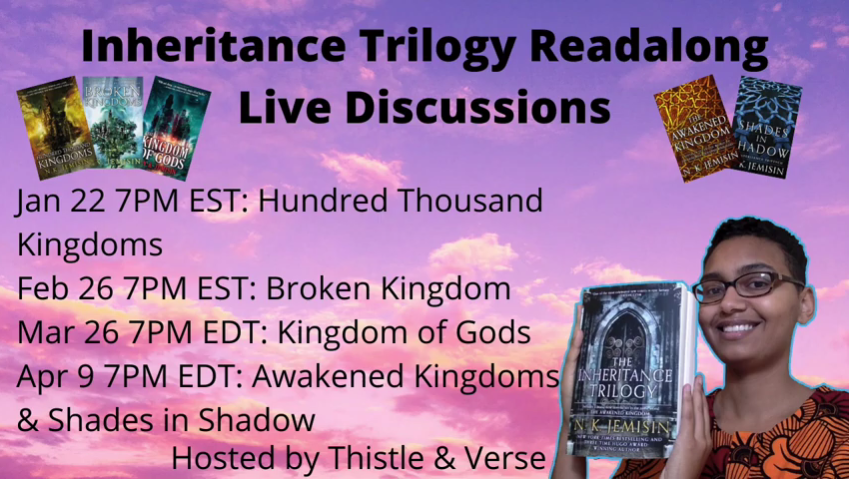
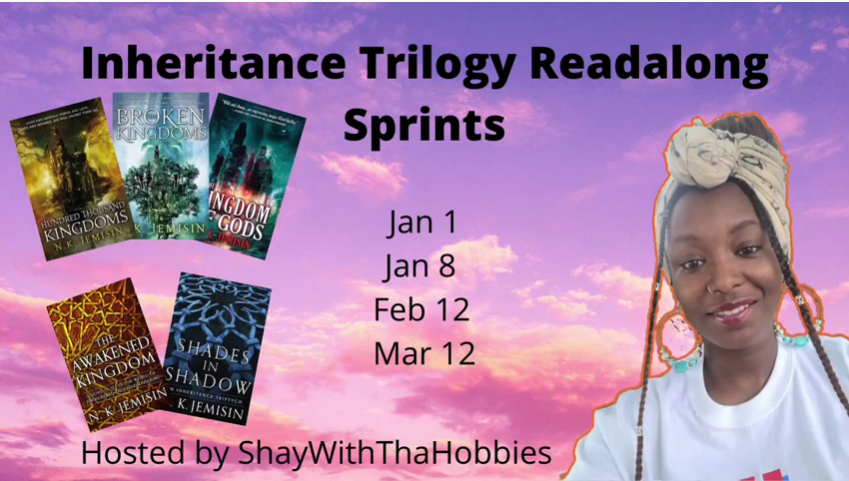
-
Title: sailor storm
Artist: Kimberly Moseberry < https://www.deviantart.com/ebony-chan >
-

Title: Angel of Grace
From: Toni L Taylor < https://starchildartbytonitaylor.com/ >
NOTE:
This special Angel was created for JonMar Creations Inc, an African America Greeting Card Company with John Erving at its helm. Angel Of Grace comes in a boxed set of 15. He has a wonderful assortment to choose from and I'm happy to have some of my images in his collection! Be sure to check out www.JonMarCards.com

-
From Mainasha < https://www.deviantart.com/mainasha >
I started posting on red bubble. I want to make more merch of my characters and take it to shows and events. Thought I would share my shop since it is up and running with a few new drawings.
Check out my store and my website for updates!linked under the comic
Her personal website
https://www.ariemonroeart.com/
Her REdbubble Shop
https://www.redbubble.com/people/ArieMonroeArt/shop?asc=u&ref=account-nav-dropdown
-
A story of a lady
-

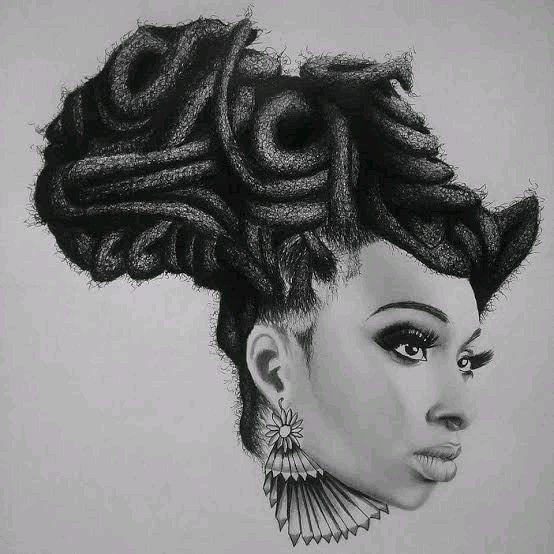
This beautiful girl 's name is Fatima .She just got herself a new sugar daddy .I heard they call the dude Li Xuan something


 I can't remember his name very well.
I can't remember his name very well.
Fatima is outrageously rich but she does not know how to make use of her wealth . Her ignorance about herself is making her to look for sugar daddies anyhow .Well... she got herself Li Xuan.
I don't have a problem with Li Xuan .
I just find the relationship between Li Xuan and Fatima a bit fishy

 .
.
Li Xuan does things for Fatima that Sir Hamilton the guru she dated before never did for her . At least Hamilton was blunt . He used to openly beat and rape Fatima whenever he wanted and nobody could say anything . He took her wealth and pride and vividly assumed his role of guru .
As time went on ,the relationship between Hamilton and Fatima started deteriorating and Hamilton freed Fatima ...at least on paper as he still has his wild dogs monitoring all her moves .That is how Li Xuan came into her life .
Li Xuan offered her all sorts of gifts ( Roads , infrastructures , health care machines and many other things ) .
Hamilton got mad at Li Xuan but he could not do much because Li Xuan is a powerful juggernaut that nothing can stop.What I find fishy with Li Xuan is that ,I know that nothing is free in life . Li Xuan refuses to marry Fatima but he keeps on spoiling her with gifts . He dresses her , sends her cars ,he has intimate relations with her but he does not rape her openly .He even helps her to get loans at zero interest rate ,loans that she obviously can not afford to reject and yet she can't repay
 . That is how Fatima got indebted so much and now Li Xuan can legally take her wealth by force . The other day ,he even confiscated one of her airports.
. That is how Fatima got indebted so much and now Li Xuan can legally take her wealth by force . The other day ,he even confiscated one of her airports.
Hamilton the guru is now laughing at Fatima

 . He laughs but he can't do much because he also depends on Li Xuan . Indeed many of the commodities that he uses come from Li Xuan .
. He laughs but he can't do much because he also depends on Li Xuan . Indeed many of the commodities that he uses come from Li Xuan .
Which one is better ? The guru type of colonialism or the subtle debt type of colonialism ? I guess NONE.
Fatima needs to know who she is and stop all the abusive relationships she has endured .Indeed she has forgotten about her past .She was a powerful queen who ruled mightily.
She can gain back her sovereignty but she needs to look intrinsically to unleash her sleeping potential .
#Alkebulan #Afrika #Homeland #Fatima
from Alexandra Tchomte < https://www.linkedin.com/in/alexandra-tchomte-48219a139/ >
Model: @dutchessofink
Artist: @markartista
Image citation : https://www.instagram.com/p/BkNOIeBHRLl/?utm_source=ig_share_sheet&igshid=127wdz3bpc0gs
-
-
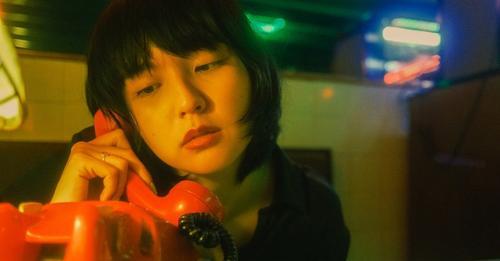
Interesting points, I Quote the article in double brackets , comment to each quote in double colons
<<Some writers think the protagonist’s “flaw” will cause the reader to turn away from the character and dismiss them, but in reality, the opposite is true: It’s what causes the reader to relate, and lean in.>>
:: not all readers, i am one that doesn't like the constant internal troubles in characters, it is very manufactured::<<If you’re writing a novel, I’d love to hear from you on this. What is your protagonist’s internal issue? And how does this issue stand between them and their goal in the story?>>
:: check out the article
https://www.janefriedman.com/what-makes-a-story-feel-like-a-story/
::
In conclusion, I think readers taste, buying readers taste, in a modernity where people have lessened their travel , even outside their home in their local community, has influenced the desire in buying readers to see internal conflict, reflecting the growing internal conflict in readers. -
Someone ask me: what will the novels of the future be if all the protagonists do everything online? You wouldn‘t have the romcoms with Julia Roberts meeting Hugh Grant in a bookshop…
He originally asked me but i feel the question is good for all to answer
My answer is in sections: epistlary fiction/subordinate characters/the modern readership-viewership-listenership
Epistles are merely letters and online communication, whether people want to admit it or not are letters. Human beings are accustomed to epistlary work. Many segments of the bible are letters. Books of letters , linear or alinear temporally, were a fiscally profitable genre in various times in the white european literary industry<said industry includes the usa or australia>. Historically, precedence exist for financial viability of or customer desire to epistlary fiction.
Modern customers of fiction love the visual,they love visual description, pseudo realism, fantastical visions. At the core of epistle is the letters are not bound to give all details, to explain all events. Writers can choose that path of creation but it isn't mandatory. Sequentially, why many writers use letters as tools for a specific purpose in a non epistlary work. But, if all the protagonists and I add antagonists use letters, then for action , descriptive action, you need subordinate characters. not supporting but subordinate. to be blunt, you need robots, you need characters that can not act alone or are extensions of the protagonists or antagonists but individual enough to have a physical identity one can write about. In parallel, think of a doctor that performs surgery remotely. The doctor actions are in the same way as writing a letter, the machine that translates the doctors motions/words/typing into action on the patient, while it does not act absent impetus from the doctor is had individual elements. its programming/its energy/its maintenance/ its environment all can have a positive or negative influence on itself that can lead to scenarios many will call drama or definitely action. But they are not protagonists or antagonists.
Customers matter, they always have and always will. Art has no bounds. Many people today apply their opinions as rules of art but the truth is, art has no ruleset to it. In parallel, making money with art is where all the judgements have value and where many artists or readers , do not speak enough of their purpose in their judgements. to that end, the modern readership , as the questioner stated individually had problems with epistlary fiction. But the reason is complex.... Most human beings are not online nor do they have money. But to the humans who have money, many are online, many are multilingual. The buyers are used to reading epistlaries every day, tweet streams, facebook streams, instagram comment streams are all epistlaries. not written by a steven king or jk rowling, but a sequence of unknown strangers, but the readers are used to reading epistlaries full of drama.
I conclude with a question, based on what was said, what kind of work epistlary can bridge what the customers do every day, with fictional characters? In the film world you already see movies that use message screens in the films. Like any style, when it doesn't have many financially successful examples, the judgement passion in literary or art circles is silent cause they have nothing to base a judgement on. So, it is an open multilog financially, like writing modern epistles with online messages.
Now, what say you all?
- Show previous comments 1 more
-

A REPLY
Have you seen the recent movie Zola? It's based on a bunch of Tweets and it's a masterpiece
...it's not for the faint of heart but I enjoyed the style, story-telling and acting -

A REPLY
'Live Free or Die Hard', no lV of the Die Hard movies, was supposedly about cyberterrorism, at least for a little while, until the computer screens got so boring that the 'Analogue cop in a digital world' started to explode into the most ridiculous special effects, e.g. shooting down a helicopter with a jumping car…
...
The opposite extreme is Daniel Glattauer's delightful 'Gut gegen Nordwind', a totally epistetolary novel that consists exclusively of the email exchange between two unknown people (a love story). Enjoyable, but it felt like a one-off gimmick. But I thought the same when the first 'rap' song appeared …
My Response
when a book doesn't have a financially viable genre isn't allowable to be called a gimmick? -

A REPLY
I fear I didn‘t understand your last paragraph. Could you explain this again? First paragraph: yes, the issue of letters within writing/films is endlessly fascinating to me too, but is it to everyone? Second: here it seems that the future of mankind - or at least literature - desperately rests on the hope that somewhere, somehow there are still a few renegade people who actually do other things apart from tapping or swiping on their phones. Things with theatrical slapstick potential.
My Response
I can restate the last paragraph, succintly. Customer taste matter more than art when it comes to fiscal profitability of art. Not the quality of art, but the fiscal profitability of art.
-

Fallen Kingdom Sneak Intro
Youtube Video
Creator deviantart
https://www.deviantart.com/mystic-skillz -
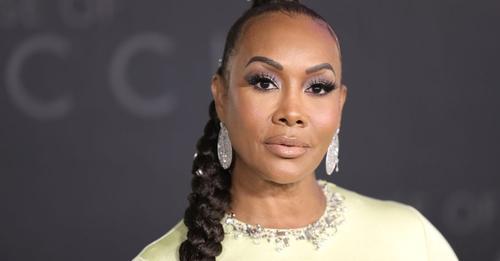
I quote vivica a fox in the article using brackets delineated by commas and ending with an ellipsis: << "“In my life, it was career over children. And I never met the man I could have children with. I didn’t.”">>, <<“I almost made that mistake and three months before my family was like, ‘You will not! You absolutely will not,'” she recalled. “I lost a whole bunch of money and deposits and this, that and the third, but I trust my family.”>>, <<“I have six godchildren that when God took away my opportunity to bear children, he sent my godbabies,” she said. “So I’ve got kids!”>> .... The article title is dysfunctional. Vivica a fox , not me, said she chose career over children, meaning what, when she got pregnant she contracepted, before fornication she contracepted so fornication was never procreation. Like many women in the usa, she was pregnant many times i bet, but she contracepted it away, for her career. men has nothing to do with her choice to be career over children. IF she didn't have a relationship with a man that satisfied her financial desires or demands to allow for pregnancy,that has nothing to do with pregnancy. Black women during enslavement had tons of kids, by all sorts of men , as they were owned, if black enslaved women who worked in fields , being whipped and raped daily, can have children , all black women after are lying to themselves using anything as an excuse for not having a child. Her second quote suggests she listens to the people she calls her family, again, another non issue. If she listens to others over her personal life, that is her doing, what do men or babymaking have to do with vivica a fox listen to somebody else over her relationships. LAstly, she spoke about god taking away her ability to have kids, which is a lie, so clearly a part of her regrets listening to family and choosing career over children, thought she accepts it. the christian god, shiva, shakti, yemnyah, quetzecoatl, or similar, do not take away womens ability to bear children, bearing children is a temporary gift from nature, not meant to be forever, so it need to be cherished while you can, the christian bible does say to be fruitful and multiply right?
ARTICLE
Vivica A. Fox On Motherhood: 'I Never Met The Man I Could Have Children With' (essence.com)
-

A REPLY
Not sure I follow your thoughts on this article. I mean, one can't take snapshot of what someone said and base their feelings of motherhood. There is more context to this and she has spoken out about mental health issues, for example. This seems so linear thinking.
MY RESPONSE
good point, I don't know vivica a fox. Moreover, I am not suggesting she is wrong or right. My point was to focus on the disconnect between bearing children and men/family/et cetera. I started off referring to the original article title, which set me off:)A REPLY
Ah, I see. That makes sense. True in of itself, the article is disjointed.
MY RESPONSE
I admit, I learned of this article from somewhere in the big bad internet and between the title and the comments I felt the need to read the article and realized most of the people who commented didn't read the article. and the article title doesn't do vivica a fox favors, she said why she didn't have children, she chose career over children. She added a comment about men, referring to your point about mental health, which is important, one must come to peace with things. but, the article , from essence magazine, is suggesting falsehood.
-
-
If Americans followed more international news and were constantly reminded that the world is much more than just "the US and everyone else," would they read more translated fiction? Would the idea that Americans don't like translations finally fade away?
Discuss.
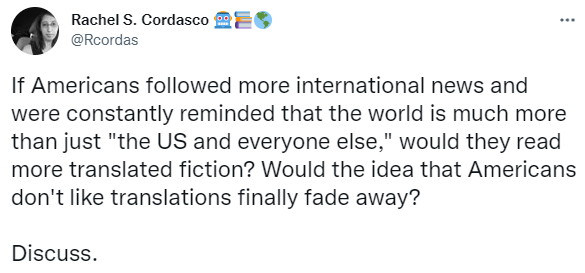
My reply
Who are americans though? your question has alot of elements to it, that relate to translated fiction. Many people in the usa, are second or third generation from people who didn't speak english so, who are the americans? The usa has the largest immigrant community(1/4) of any country in humanity and yet, translated works don't have increased value. I argue, immigrant communities have failed the languages of the countries they come from? Maybe the immigrant community in the usa, sees the world as the usa and everybody else? (2/4) I know for sure many immigrant parents don't teach the language they were raised with to their kids. I Argue many people <native american /descended of enslaved/modern immgrant/anglo saxon protestant> in the usa follow international news and (3/4) have holidays in the usa where they boast about an equal love to the country they come from as well as the country they are in, but the truth is, the entire group emphasize the usa first the only true solution i see is a change in wanting to be american by immigrants in america? (4/4)


